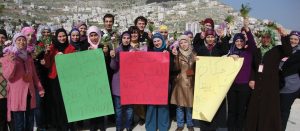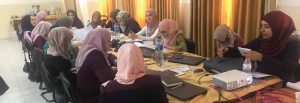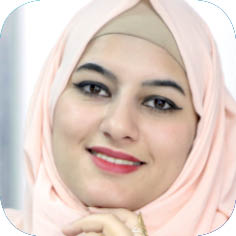Ihave learned a great deal and achieved a number of goals in my work with NGOs as a coordinator, administrative assistant, and PR officer of development projects. My professional goal is to contribute to the building of a Palestinian society that respects individual rights and freedoms, especially those of minorities, of people who are neglected, and of children and women. A creative and significant project that was implemented last year aimed to enable Palestinian rural women through e-commerce projects. It was inspiring to witness the progress and improvement of women throughout the successive levels of the project and how they transformed from unemployed, unproductive individuals into financially independent women who run their own e-commerce projects.
The Palestinian Central Bureau of Statistics (PCBS) states that in 2017, persons from 20 to 29 years of age who obtained an intermediate diploma or bachelor’s degree were specialized in the following fields: business and administration (32 percent of men, 23 percent of women), engineering and engineering trades (8 percent of men, 4 percent of women).*2
It is important to create a female-friendly entrepreneurship eco-system in Palestine to increase chances for success among women entrepreneurs in creative industries. This essential issue needs to be highlighted and discussed: many women have been struggling to find the right setting that would allow them to engage in creative industries, and many others have been facing numerous challenges at every stage of establishing their own businesses. Questions regarding the core problem of low participation of young women in entrepreneurship and the lack of young women entrepreneurs in creative industries in Palestine bring to mind a number of reasons that mainly include cultural prejudices and traditional beliefs but also an inadequate support system. Young women rarely choose to pursue careers in entrepreneurship, thus condemning themselves to lower-paying jobs and failing to reach their full potential. The causes of this problem are numerous and can be divided into the following areas.

• education and skills of young women: the lack of entrepreneurial education and spirit, and an insufficient level of technical skills
• cultural prejudices and traditional beliefs: the general attitude that entrepreneurship is not the right occupation for young women since it takes a toll on personal and family life; and the unfavorable and sex-biased climate among the entrepreneurial community in Palestine
• an inadequate support system for women entrepreneurs: the lack of relatable and inspiring role models (successful women entrepreneurs are unknown in the public and those who are known are perceived negatively, as too aggressive and unfeminine; this is relevant especially in rural communities and refugee camps and to a somewhat lesser degree in the larger cities); and a lack of founders capital to start their businesses
• an inadequate policy framework: insufficient consolidated effort on the national level; a lack of relevant strategic documents and plans to support female entrepreneurship; and a lack of relevant and up-to-date sex-disaggregated data, particularly concerning creative and digital industries
Several levels need to be discussed and managed to enable a more female-friendly entrepreneurship eco-system and increase chances for the success of women entrepreneurs in creative industries in Palestine.
Segments of the Palestinian population are considered to be among the more traditional and patriarchal societies in the MENA region, and women in the occupied Palestinian territory suffer from high levels of poverty and unemployment, with women refugees particularly vulnerable. The rate of female participation in the labor market in the West Bank and Gaza stood at 13.4 percent in 2006, half the average rate in Arab countries and one of the lowest in the world.*1 Gender discrepancies are severe and their consequences are visible in all areas of life, which is evidenced by the fact that, in 2017, according to estimates by the Palestinian Central Bureau of Statistics, the labor force participation rate was 72.5 percent men compared to 17.3 percent women, which is only a small increase from the numbers documented in 2006.

Too many children in Palestine are still brought up in accordance with patriarchal gender roles, where girls are told that science and technology are “too hard” for them and that entrepreneurship is a “man’s job,” as it takes a toll on personal and family life. Although more females than males finish university-level education (53.9 percent to 26.1 percent), their unemployment rate is higher. The majority of females study human sciences and arts, and they mainly work in lower-paying jobs, whereas the majority of males work in well-paid industry jobs. The PCBS states that about 50,000 workers in our country earn less than the legal minimum wage or less than 1,450 NIS per month, and 85 percent of these are working women. A large number of females earn 700 shekels per month or even less.*3
Contributing to a more female-friendly entrepreneurship eco-system and increasing the chances for success of women entrepreneurs in creative industries in Palestine can help women overcome the challenges related to the Israeli-blockade, closure, economic policies, and movement restrictions.
So what should we do to contribute to a more female-friendly entrepreneurship eco-system and increase the chances for success for women entrepreneurs in creative industries in Palestine? What has to be done to ensure long-term benefits for young women entrepreneurs working in creative industries in Palestine, but also for other young women and girls who are considering a career in this area and working on their business ideas?
On the technical level, improving the technical skills of women will produce direct benefits for their businesses, as it will allow them to use their newly acquired knowledge to further develop their businesses and make them more competitive and successful in the market. On the economic level, improving the business skills of young, active, and potential entrepreneurs will produce direct economic benefits for their businesses since it will help them become more competitive and increase their chance for success in the market. On the policy level, research and studies on gender-based discrepancies in entrepreneurship and creative industries in Palestine are needed to produce recommendations for the improvement of the policy framework for female entrepreneurship in Palestine. A handbook on innovative models to support female entrepreneurship on national, local, and in-company levels should be created to provide guidance and pointers for decision-makers on how to improve the policy framework for female entrepreneurship. An improved policy framework and increased support for young women entrepreneurs will significantly contribute to improved conditions for youth and women entrepreneurs in Palestine.
On the social level, a support mechanism for young women entrepreneurs must be developed as this will significantly increase their chances for success in the market and thus contribute to overall improvement of the economic status and quality of life of young women in Palestine, one of the most disadvantaged groups in the entrepreneurship field of work. An extensive promotional campaign should bring the issue of female entrepreneurship into the center of public attention and could increase awareness on the importance of this issue for the socio-economic development of Palestinian society, which will significantly benefit any future efforts to support women’s entrepreneurship.
For more than 70 years, Palestinian society has been preoccupied with the Palestinian-Israeli conflict that has highlighted the contribution and role of women as not limited to the social role of caregivers within the family. Beyond these tasks, women have played and still play an active and remarkable role in political participation. Promoting and adopting policies that support the existence and presence of women entrepreneurs in the economic and commercial arena will create revenue-generating businesses that improve the livelihood of Palestinian women and allow them to participate constructively in the economic and social development of their society. Notably, technological development is increasing and becoming one of the engines and pillars of Palestinian development. Its full potential cannot be achieved without the recognition and support of women entrepreneurs’ creativity, originality, and imagination.


